QuestionQUESTION: Hi, thanks for your time...I have a blue and gold, and she was very sweet when we first got her home, I have had her for about 3 months now, and she is starting to get nippy..hard nips. They don't seem like they are out of anger, or aggression, she just chews hard when she has stepped up. I don't know how to get her to stop that. She hurts. I can pet her under her wings, the top of her head, tail, she is pretty good about that, I just keep doing it, and so do my daughters friends, she is pretty friendly with everyone, but she does like to nibble hard on me. I don't want to get mad at her, because I love her. Any advice would be great.
ANSWER: You mention that you've had her for about 3 months, but how old is she ?
Petting under the wings and at the tail area may be triggering 'mating' nips, which can be pretty hard since with another bird it would be beak to beak.
Check my site for more ways to modify this behavior
www.4AnimalCare.org (click the bird tab)
---------- FOLLOW-UP ----------
QUESTION: She will be 1 year on July 2. The avian vet I have taken her to told me to keep petting her like that, so she will stay well socialized and friendly. So, I am doing that wrong? I shouldn't be touching her under wings and down her tail? I have also noticed her feathers thinning out on her chest, by her left wing....I do sweep up alot of down feathers, and occasionally some yellow feathers...she is feather plucking isn't she?
ANSWER: OK, at this age the petting shouldn't trigger egg laying or mating behavior, but the points that provoke the behavior when a male is available is touching under the wing area on the top (just above the base of the tail). This is where the male would 'thump' with his feet to get the female to back up to him and move her tail to one side or the other. Then she'd feel his cloaca against hers (the area where droppings come from) and this triggers the release of and formation of eggs internally.
If she were mature enough to have this happen, the feather plucking would also be something rather usual from their underside. It exposes the skin to be able to better regulate the egg temp once laid and it's also what they'll use to line their nest (thus the phrase, 'feathering your nest').
It's molting season though. All of my birds are leaving feathers everywhere - and I'm amazed that they have any left on! Even though you don't see pinfeathers at this point, doesn't mean they won't appear. It's perfectly natural for some spots to look thinner than others at this time of year.
I just don't want you to panic. When we get worried or stressed, our birds pick up on it. Instead of worrying, since you've done all the right things and you know she's ok, lavish her with extra attention and keep her occupied, challenged and interested.
Check back and let me know ok?
---------- FOLLOW-UP ----------
QUESTION: Ok, another question..in the morning when I let her out of her cage, I know she is happy to be out, but, she really bites me pretty hard, (has not drawn blood yet, so I must be lucky)and wants me to bring her all over the house to look out windows, and mirrors, but she is still chewing on me. Then she makes a regurgitating motion, and chews, tongues my fingers. What does that mean, and why is she chewing/biting me? I guess I am not the favorite person. But, I AM the person who is with her the most, spends most of my time with her. I also am not sure if I am keeping her challenged enough. Can you help me with ideas to challenge her and keep her happy?
Answer It sounds like she DOES like you, after all - she's left you your fingers.
The walk around the house is something she obviously enjoys so make a routine of it. My in house girls have a morning and evening routine that announces the start of their day and time for bed. Part of it includes looking out a window and saying "hello day!"
Before they go into their daytime cages they get a song that they sometimes try to sing along. There is nothing worse (or more endearing) than a macaw's singing voice.
"Beaking" is how birds, especially macaws, communicate affection or other 'emotions'. Sometimes it's just out of boredom or to test how much pressure they can exert without harm. One of my girls came to me as a biter and though she's far from a problem anymore, she will still push that limit and try my patience.
Challenges can be as simple as hiding a treat under some large pebbles in a different looking food dish in her cage. Be sure the pebbles aren't small enough to swallow.
There are many puzzle toys on the market that involve the bird working a latch or maneuvering the toy to get a treat out.
One of my larger macaws favorite toys is a toddlers plastic ball with a smaller ball inside with bells in it. This thing has been indestructible and she consistently tries to get that inner ball with the bells out.
Some other interesting toys are nothing more than pieces of wood wrapped in bird-safe paper - or, if you don't mind a bit of a mess once in a while, some adding machine paper rolls on a spool secured above/outside the cage where she has to work a bit to unravel it.
I've often found my girl buried under this mountain of unraveled paper and laughing, diving and shredding. I only give this once in a while so it's a real fun treat.
A paper towel tube (as long as it's not dyed or scented) can hold a peanut and with both ends twisted shut it's a challenge with a reward.
Hang big leafy greens that are still wet from a fresh water rinsing (find bird safe clips online or in some pet stores). I prefer hard plastic clamps since many of the metal clamps might be zinc - and this isn't good if the bird tends to gnaw at the clamps, which mine do.
Since she's going to be with you for another half century or more - it's plenty of time to learn new things to offer.
Sometimes the biggest challenge is for US to come up with new challenges!

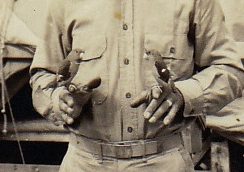 ID Birds
Question
Panama Birds
My uncle served in Panama in 1941
ID Birds
Question
Panama Birds
My uncle served in Panama in 1941
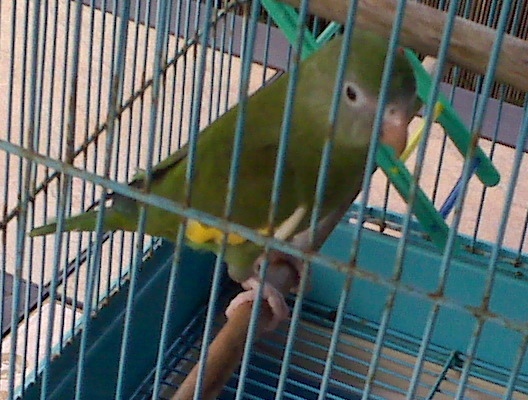 What type of parrot is this?
Question
Friendly bird
A week ago ths small parrot flew
What type of parrot is this?
Question
Friendly bird
A week ago ths small parrot flew
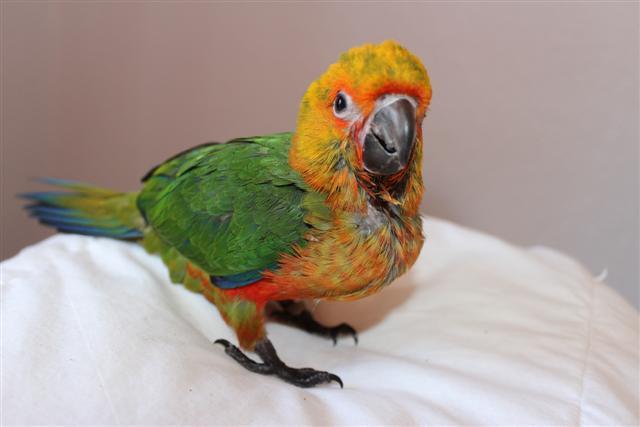 Jenday Conure Weaning?
Question
Castor the Conure
Hi
I have a 9 week o
Jenday Conure Weaning?
Question
Castor the Conure
Hi
I have a 9 week o
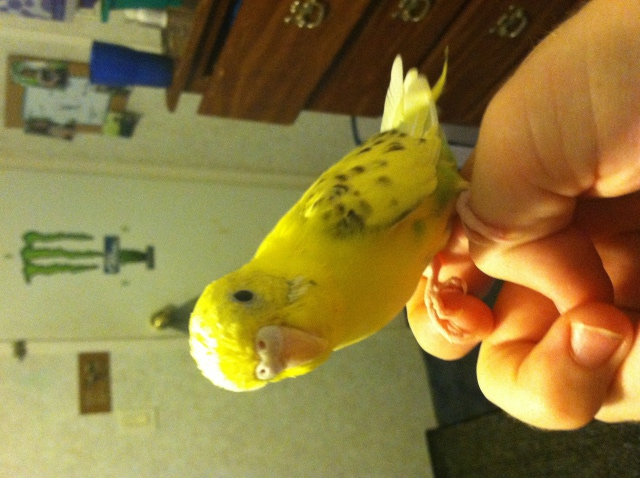 Parakeet gender
Question
Parakeet
Hi, I looked for an expert und
Parakeet gender
Question
Parakeet
Hi, I looked for an expert und
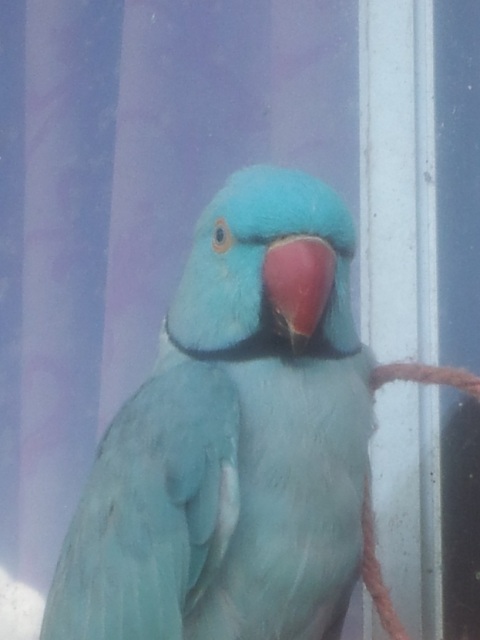 RE: Indian Ringneck probems
Question
Indy our Ringneck
Thank you for your he
RE: Indian Ringneck probems
Question
Indy our Ringneck
Thank you for your he